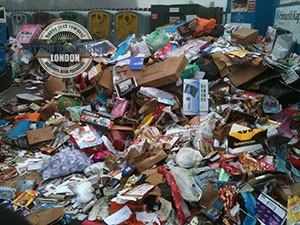Making rubbish is a part of life, it is basically unavoidable even with the best of intent. Having said this, the amount of rubbish a person generates in a day can be reduced. Indeed, one person’s efforts might seem like a drop in the sea, but if everyone was doing their little bit – things would be much different.
There are many common rubbish reduction practices one can apply in their day to day life. Take for example plastic bags – many people buy their groceries in plastic bags which is a problem for the environment because plastic bags require lots of energy to produce (more industrial pollution), but more so they take hundreds of years to degrade (even biodegradable plastic bags take quite some time to break down naturally). One way to reduce the amount of plastic bags, which are basically household waste, is to do groceries and daily shopping in reusable bags. These could be fabric, or plastic however they are reusable which makes them more environmentally friendly. Problem with reusable shopping bags is forgetting to take them with you, so instead of just one have two or three bags – you can always keep one in the car in case you forgot to bring the one from home.
 Opting for food stuffs and groceries with less packaging is also an important rubbish reduction principle that will limit the waste created by your household. Instead of buying individually packaged/wrapped products, buy things from the bulk section of your supermarket. Many if not most of the food supplies and products needed by the household are available in bulk. Store food stuffs in airtight glass jars or plastic containers for long-term use. Water bottles (of all kinds) are a major environmental violator and make lots of rubbish at home. Again, if possible buy larger water bottles for longer term use – like the ten or twelve litre household water containers that come with a pump on top.
Opting for food stuffs and groceries with less packaging is also an important rubbish reduction principle that will limit the waste created by your household. Instead of buying individually packaged/wrapped products, buy things from the bulk section of your supermarket. Many if not most of the food supplies and products needed by the household are available in bulk. Store food stuffs in airtight glass jars or plastic containers for long-term use. Water bottles (of all kinds) are a major environmental violator and make lots of rubbish at home. Again, if possible buy larger water bottles for longer term use – like the ten or twelve litre household water containers that come with a pump on top.
Changing your daily diet can also give the environment a breather. Takeaway food, microwave dinners etc. are all examples of food which uses a lot of packaging prior to consumption. Replace some of your daily meals with dishes you cook at home, if you have the time and energy to do so of course. If you do, chances are you will also be eating healthier. Indeed in this case your household consumes electricity to cook food, though this is not as bad as much of the energy provided to homes these days comes from green, or at least partially sustainable sources.
If you are also looking to de-clutter your home and get rid of rubbish that’s already there, you can either do it yourself or call in for a specialised rubbish removal service. If you live in an area with lots of domestic rubbish disposal requirements, perhaps it is better to use a specially arranged rubbish removal service as the waste management technicians will know how to sort and dispose of different types of rubbish appropriately and without risking further environmental pollution.
